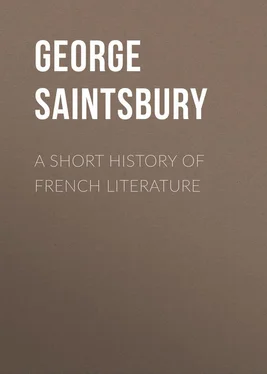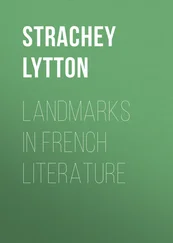George Saintsbury - A Short History of French Literature
Здесь есть возможность читать онлайн «George Saintsbury - A Short History of French Literature» — ознакомительный отрывок электронной книги совершенно бесплатно, а после прочтения отрывка купить полную версию. В некоторых случаях можно слушать аудио, скачать через торрент в формате fb2 и присутствует краткое содержание. ISBN: , Жанр: foreign_prose, на английском языке. Описание произведения, (предисловие) а так же отзывы посетителей доступны на портале библиотеки ЛибКат.
- Название:A Short History of French Literature
- Автор:
- Жанр:
- Год:неизвестен
- ISBN:http://www.gutenberg.org/ebooks/33062
- Рейтинг книги:3 / 5. Голосов: 1
-
Избранное:Добавить в избранное
- Отзывы:
-
Ваша оценка:
- 60
- 1
- 2
- 3
- 4
- 5
A Short History of French Literature: краткое содержание, описание и аннотация
Предлагаем к чтению аннотацию, описание, краткое содержание или предисловие (зависит от того, что написал сам автор книги «A Short History of French Literature»). Если вы не нашли необходимую информацию о книге — напишите в комментариях, мы постараемся отыскать её.
A Short History of French Literature — читать онлайн ознакомительный отрывок
Ниже представлен текст книги, разбитый по страницам. Система сохранения места последней прочитанной страницы, позволяет с удобством читать онлайн бесплатно книгу «A Short History of French Literature», без необходимости каждый раз заново искать на чём Вы остановились. Поставьте закладку, и сможете в любой момент перейти на страницу, на которой закончили чтение.
Интервал:
Закладка:
BOOK I
MEDIAEVAL LITERATURE
CHAPTER I
THE ORIGINS
Relation of French to Latin.
Of all European literatures the French is, by general consent, that which possesses the most uniformly fertile, brilliant, and unbroken history. In actual age it may possibly yield to others, but the connection between the language of the oldest and the language of the newest French literature is far closer than in these other cases, and the fecundity of mediaeval writers in France far exceeds that of their rivals elsewhere. For something like three centuries England, Germany, Italy, and more doubtfully and to a smaller extent, Spain, were content for the most part to borrow the matter and the manner of their literary work from France. This brilliant literature was however long before it assumed a regularly organized form, and in order that it might do so a previous literature and a previous language had to be dissolved and precipitated anew. With a few exceptions, to be presently noticed, French literature is not to be found till after the year 1000, that is to say until a greater lapse of time had passed since Caesar's campaigns than has passed from the later date to the present day. Taking the earliest of all monuments, the Strasburg Oaths, as starting-point, we may say that French language and French literature were nine hundred years in process of formation. The result was a remarkable one in linguistic history. French is unquestionably a daughter of Latin, yet it is not such a daughter as Italian or Spanish. A knowledge of the older language would enable a reader who knew no other to spell out, more or less painfully, the meaning of most pages of the two Peninsular languages; it would hardly enable him to do more than guess at the meaning of a page of French. The long process of gestation transformed the appearance of the new tongue completely, though its grammatical forms and the bulk of its vocabulary are beyond all question Latin. The history of this process belongs to the head of language, not of literature, and must be sought elsewhere. It is sufficient to say that the first mention of a lingua romana rustica is found in the seventh century, while allusions in Latin documents show us its gradual use in pulpit and market-place, and even as a vehicle for the rude songs of the minstrel, long before any trace of written French can be found.
Influence of Latin Literature.
Meanwhile, however, Latin was doing more than merely furnishing the materials of the new language. The literary faculty of the Gauls was early noticed, and before their subjection had long been completed they were adepts at using the language of the conquerors. It does not fall within our plan to notice in detail the Latin literature of Gaul and early France, but the later varieties of that literature deserve some little attention, because of the influence which they undoubtedly exercised on the literary forms of the new language. In early French there is little trace of the influence of the Latin forms which we call classical. It was the forms of the language which has been said to have 'dived under ground with Naevius and come up again with Prudentius' that really influenced the youthful tongue. Ecclesiastical Latin, and especially the wonderful melody of the early Latin hymn-writers, had by far the greatest effect upon it. Ingenious and not wholly groundless efforts have been made to trace the principal forms of early French writing to the services and service-books of the church, the chronicle to the sacred histories, the lyric to the psalm and the hymn, the mystery to the elaborate and dramatic ritual of the church. The Chanson de Geste , indeed, displays in its matter and style many traces of Germanic origin, but the metre with its regular iambic cadence and its rigid caesura testifies to Latin influence. The service thus performed to the literature was not unlike the service performed to the language. In the one case the scaffolding, or rather the skeleton, was furnished in the shape of grammar; in the other a similar skeleton, in the shape of prosody, was supplied. Important additions were indeed made by the fresh elements introduced. Rhyme Latin had itself acquired. But of the musical refrains which are among the most charming features of early French lyric poetry we find no vestige in the older tongue.
Early Monuments.
The history of the French language, as far as concerns literature, from the seventh to the eleventh century, can be rapidly given. The earliest mention of the Romance tongue as distinguished from Latin and from German dialect refers to 659, and occurs in the life of St. Mummolinus or Momolenus, bishop of Noyon, who was chosen for that office because of his knowledge of the two languages, Teutonic and Romanic 5 5 'Fama bonorum operum, quia praevalebat non tantum in Teutonica sed in Romana lingua, Lotharii regis ad aures usque perveniente,' says his life. The chronicler Sigebert confirms the statement that he was made bishop 'quod Romanam non minus quam Teutonicam calleret linguam.' Lingua Latina and Lingua Romana are from this time distinguished.
. We may therefore assume that Mummolinus preached in the lingua Romana . To the same century is referred the song of St. Faron, bishop of Meaux 6 6 The Latin form of the song is given by Helgaire, Bishop of Meaux, who wrote a life of St. Faron, his predecessor, towards the end of the ninth century. Helgaire uses the words 'juxta rusticitatem,' 'carmen rusticum;' and Lingua Rustica is usually if not universally synonymous with Lingua Romana .
, but this only exists in Latin, and a Romance original is inferred rather than proved. In the eighth century the Romance eloquence of St. Adalbert is commended 7 7 'Si vulgari id est romana lingua loqueretur omnium aliarum putares inscium.'
, and to the same period are referred the glossaries of Reichenau and Cassel, lists containing in the first case Latin and Romance equivalents, in the second Teutonic and Romance 8 8 The Reichenau Glossary is at Carlsruhe. It was published in 1863 by Holtzmann. The Cassel Glossary, which came from Fulda, was published in the last century (1729).
. By the beginning of the ninth century it was compulsory for bishops to preach in Romance, and to translate such Latin homilies as they read 9 9 Ordered by the Councils of Tours, Rheims, and Arles (813-851).
; and to this same era has been referred a fragmentary commentary on the Book of Jonah 10 10 In the Library at Valenciennes.
, included in the latest collection of 'Monuments 11 11 Les plus anciens Monuments de la Langue Française. Paris, 1875.
.' In 842 we have the Strasburg Oaths, celebrated alike in French history and French literature. The text of the MS. of Nithard which contains them is of the tenth century.
We now come to documents less shapeless. The tenth century itself gives us the song of St. Eulalie, a poem on the Passion, a life of St. Leger, and perhaps a poem on Boethius. These four documents are of the highest interest. Not merely has the language assumed a tolerably regular form, but its great division into Langue d'Oc and Langue d'Oil is already made, and grammar, prosody, and other necessities or ornaments of bookwriting, are present. The following extracts will illustrate this part of French literature. The Romance oaths and the 'St. Eulalie' are given in full, the 'Passion' and the 'St. Leger' in extract; it will be observed that the interval between the first and the others is of very considerable width. This interval probably represents a century of active change, and of this unfortunately we have no monuments to mark the progress accurately.
Pro deo amur et pro christian poblo et nostro commun salvament, d'ist di in avant, in quant deus savir et podir me dunat, si salvarai eo cist meon fradre Karlo et in aiudha et in cadhuna cosa, si cum on per dreit son fradra salvar dist, in o quid il mi altresi fazet, et ab Ludher nul plaid nunqua prindrai, qui meon vol cist meon fradre Karle in damno sit.
Читать дальшеИнтервал:
Закладка:
Похожие книги на «A Short History of French Literature»
Представляем Вашему вниманию похожие книги на «A Short History of French Literature» списком для выбора. Мы отобрали схожую по названию и смыслу литературу в надежде предоставить читателям больше вариантов отыскать новые, интересные, ещё непрочитанные произведения.
Обсуждение, отзывы о книге «A Short History of French Literature» и просто собственные мнения читателей. Оставьте ваши комментарии, напишите, что Вы думаете о произведении, его смысле или главных героях. Укажите что конкретно понравилось, а что нет, и почему Вы так считаете.












